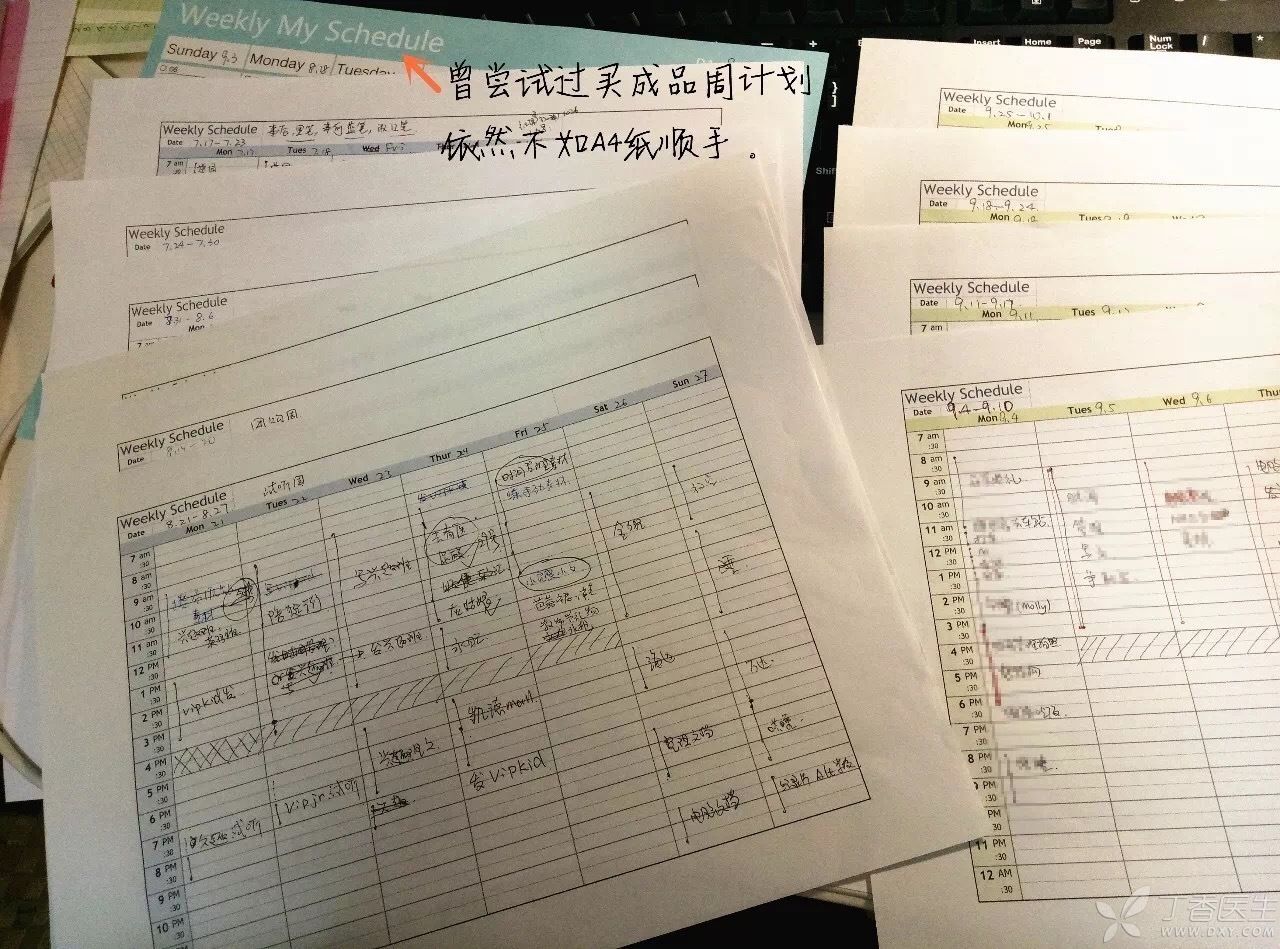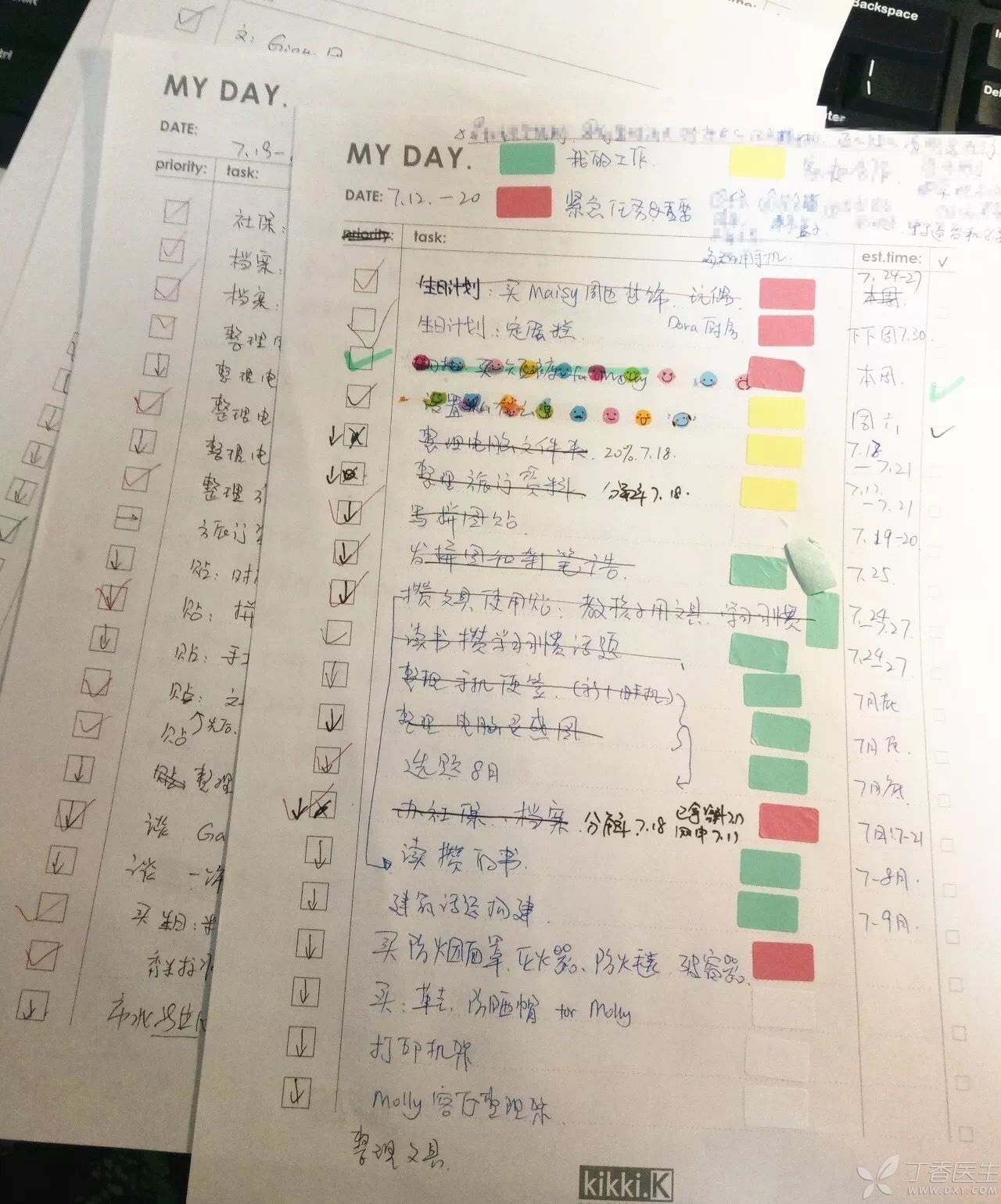If you are a stay-at-home mother like me, or a housewife of a somewhat freelance nature, the difficulty of self-management may be comparable to that of a business owner.
Business owners can still make money their goal and push off customers they don’t want to see. However, our time has been broken into pieces by our children, involuntarily, but we can’t afford it.
The goal is even more vague. For example, what is the specific definition of the goal of “cultivating good children” and how to achieve it? No educator dares to give your children an established plan.
So the goal is to take one step at a time? Efficiency is even more fragmented.
How to use loose sand to build castles requires us to consider the amount of water added and the ability to build buildings.
The reason why many people are in urgent need of time management methods when they become mothers is that the life stages are different and the goals and efficiency are challenged unprecedentedly, and so am I.
Writing this post can only set the goals and efficiency of one’s own part. It needs to be adjusted at any time according to the child’s condition. It can be said that adapting to this adjustment is part of management.
Of course, if you are a working mother, your ability to split into two is also a big test. Working mothers need twice as much time management ability as stay-at-home mothers if they are busy with their work and the rear forces are not very powerful.
The whole time is only used for high-speed brain work.

After the children and teammates came home, I was a stay-at-home mother, coordinating the time of the children and teammates.
When they all went out, I was queen of the home ~
The whole time of these few hours is my freelancer’s working time. I will write articles during this whole period of time. Other mothers may use this time to do some work with great freedom, such as insurance, purchasing on behalf of others and micro-business. No matter what, as long as it is used to exchange money, it is considered freelancer.
Before Molly went to kindergarten, I hardly made what plans, but simply made a list as a memo, so I admire the mothers who took care of their children all day but still wrote their accounts in an orderly way.
Now my daily rhythm is like this:
From 9: 00 a.m. to 4: 00 p.m. from Monday to Friday, the time when the children go to kindergarten is my own whole time, which is the time when I can run efficiently.
There are no special events. All debris events, such as housework, have to give way to the children after school. During this period of time, try to only do things that require high-speed brain use.
There is no need to plan the time with children.

However, for the time after school, only [event reminders] (i.e. The rolling list below) are still made, and [tasks] (i.e. The weekly plan below) are not arranged.
Children usually get home at 4: 30 or more than 5: 00, I will play some small games with you until 6: 30, It is interspersed with food preparation and cooking. After the meal, it is about 7: 30. The baby will accompany him when he needs to play with him. He does not need to sort out some fragments of daytime affairs, such as talking about things online, checking simple information, shopping online and other things that do not cost his mind and can be put down at any time (i.e. Things in the following notes and mobile phone reminders).
Weekend tasks focus on space movement (where to play, what) and how to arrange the time. Everything depends on the mood or events.
In a word, the time with the children is almost unplanned, only the event supports, there is no time node, where to slide, only eat and sleep time to divide the large pieces, only one list works.
In short, it is: just focus on the goal and ignore the efficiency.
How can I continue to do things that are boring but have to be done? It is to dismantle the task, which will make it simpler. After finishing it, arrange some happy plans to reward yourself and combine work and rest.
Oh, yes, I used to sleep more than 2 o’clock in the middle of the night every day, but now I can basically sleep more than 12 o’clock, because there is no room in my weekly plan to arrange things, and all my worries are finished during the day.
Next, I will focus on my time management tools: 1 scrolling list, 1 weekly plan, 1 notebook/paper, 1 mobile phone reminder list/mobile phone note.
Use a sheet of A4 paper to make a one-week plan.

Even though there are tens of millions of hand books for planning, it is not as good as A4 paper to me. It is also real irony that a person who has controlled stationery to open a stationery store has never used hand books that have been dependent on for more than one month.
It’s not that people’s accounts are not good, but that they are not willing to adjust to the rhythm arranged by the accounts. Another important reason is that I am too lazy to go through the notebook (A4 paper can throw away or archive the used-up plan instead of keeping it in the notebook all the time, but the loose-leaf manual account is actually a good substitute in this respect).
Therefore, what we stick to is a stack of weekly plans printed on A4 paper and adjusted by ourselves according to the template. The weekly or several-week plans are always placed at the edge of the workbench (fixed workbench is also very important, its important function is to place some [doing] things, and my workbench is at the edge of the computer).
In addition, I no longer make daily plans alone every day, but only do simple event reminders. My event reminder is a list. If it is something that needs to be done outside the workbench or at home, put the reminder part in the mobile phone calendar or note as a mobile list.
Regarding the planning principles of Zhou Plan, my experience is as follows:
Don’t be too ambitious, that is, don’t plan too big or too full. Make it according to your time control ability. If you don’t know how to control your time yet, read < < Strange Life > > and let it teach you, or stick to it for a period of time and optimize it for me.
One-week plan content

List the events in the list and continue to be subdivided if they can be subdivided. Schedule external task nodes to coordinate the timing of manifest events.
After the event, write down some events to facilitate understanding of your time usage.
Don’t feel guilty about not completing it.
It’s a big deal to delay, it’s a big deal to delete (because the most important and urgent things will not be delayed even if there is no plan). You make the plan, and of course you have the right to delete and rewrite it. Slowly, you will find that as you know yourself, the implementation of the plan will get higher and higher.
The reason for using A4 paper is that the tools are simple. I remember the A4 paper I drew well, and then replace it with a beautiful hand book that needs to adapt to the established format. Only in this way can I slowly remember that it is easy to use and beautiful. You can’t eat into a fat man in one bite, and you can’t indulge too much in the format of the book (and give up the original intention of recording).
The same is true for some time management apps with good reputation. As long as you feel that you still need to learn, you must think about whether it is worth learning. Learning new tools requires time and energy. You must avoid the situation that you are unwilling to start planning after learning new tools.
It is a question whether people wear clothes or clothes.
If you are used to using daily and monthly plans, then continue and don’t change your habits just because I say I think weekly plans are good.
Of course, if I am not a secretary (full-time) or a student party (time is fixed), I personally don’t think it is necessary to use daily planning, weekly planning and monthly planning, which is too complicated.
This is also why I don’t like to use hand books in that kind of comprehensive format. My beautiful (gui) books are now most useful for taking reading notes.
Use a long rolling list to finish basic life items.

(Use different symbols to indicate the degree of progress of the event, √ means that it is finished, and the picture is to scroll to the next list.)
As part of a housewife’s job, a list is enough to handle basic living items.
The function of the list is to make memos and sort out thoughts, and it is the responsibility of events. As I said, all the meaning of time is because there are events linked together one by one and try not to do meaningless events.
So the list is well done, in a sense, more important than the plan.
Regarding the listing, I probably adhere to the following principles:
Step 1 Make a list of recent events
For example, what is to be done within a month or a week depends on how many things are to be done.
Remember to be more detailed about things within a day or two, otherwise it is difficult to have execution. What you want to do in a week or even a month can be remembered vaguely, which is the function of putting out such a wish.
Moreover, to control the total amount, if there are too many such [wishes] items, a single wish list is required.
2. Don’t keep a daily list
In this way, the workload is too heavy, as long as it is a long list, rolling it.
If you cross out the finished ones, and if you mix too much between the finished ones and the unfinished ones and delay reading, you will continue to scroll with another one.
3. Be as specific as possible in the near future
The content of the events in the past day or two should be as specific and easy to implement as possible, that is, the events that can be achieved in one step.
For example, buy a what and where to buy it, tidy up which room in the home, where to do some what, take the children to play with some what things, repair a what place, and try to write down what can be done at the last time. As long as it starts, there will be no breakpoint.
This is very important. If it is the kind of event with breakpoints, it will always be on the list and will continue to secrete frustration for you.
4. Record events that need to cross with other people
For example, if you want to make an appointment with someone, you need to coordinate the time with your family to do what affairs together, and make some appointments in the service industry. It is the kind that you have not made an appointment yet. Please put it on the list and wait for discussion. If you type the time, remember to write it down as a reminder on your mobile phone.
5. Don’t write regular tasks
For example, when to take a bath, eat, the children sleep, etc. In short, the daily routine has already formed a habit or must do the daily routine that cannot be escaped, so don’t write it. You can’t forget it anyway. Don’t waste the list space to create the illusion or interference of [being very busy] and increase anxiety.
Therefore, if your routine tasks are already packed with every minute and second and you don’t have time to Taobao, you should not do list management for the time being. It is more important to optimize your routine.
6. Don’t write about urgent matters
Urgent matters are usually not on the list because they will not be forgotten.
If you are afraid of forgetting, you should also write it down in the mobile phone reminder. Just like when we were young, we wrote down what the teacher told us on the back of our hands.
7. The contents of the list may be deleted
Don’t force yourself to do everything. Some things you thought were important at that time, so write them down. Maybe you don’t think they are so important in a week, then cross them out.
Not doing it for a week does not delay life. It is definitely not an urgent matter. If you are willing to cross it out again, it is definitely not important.
However, I suggest that we all remember it. Maybe what was not important at that time, after a week of remembering, did we feel that the level of importance had increased?
Therefore, the list I am talking about here is, after all, a means to sort out thoughts (throw out trivial matters from the mind) and adjust the importance level. It is not a list of must-do events. It is [want]/[might to do list], not [must to do list].
Prepare a memo or notebook to record things that cannot be written in the list.

The responsibilities of the notebook vary from person to person.
A Freetime List
That is, the list of things to do in spare time and fragmented time.
If you are willing to subdivide, you can write a 5-minute fragment list, a 15-minute fragment list, a 30-minute fragment list, etc. Of course, you can also have a boring list for a whole day. You can also write this list for your children so that you can immediately choose a thing you want to do in your spare time.
This is a skill introduced by a foreign blogger at Station B (resource number av11838383, up owner: call me Deer DeAr). It is very useful to record things that can break points, such as which book to read, which video to watch, and doing what homework.
Freetime List is generally used to record fragment events and events that can be broken at any time.
A wish list
If you want to do a lot of unfulfilled wishes, for example, many movies have not been seen, many tours have not been realized, many things can’t be bought for the time being but want to buy, and so on, if you can’t realize for the time being but can’t get rid of them, put them on the wish list.
My own list is already very short, not all of which have been realized but all of which have been dismissed by me. Instead, I helped Molly make a wish list. She is still a dreamy age.
A shopping list
If there are many things, you can separate the shopping list from the long rolling list mentioned earlier. For example, sometimes the shortage of daily necessities at home breaks out in a concentrated way, or e-commerce is greatly promoted, so it is necessary to list this item.
Usual Fragments and Random Thoughts

Some interesting little thoughts, some epiphany things.
Some good things, good movies and good books provided by others (grass has been planted but it is not your wish yet), and some records that cannot be classified into whole pieces can be recorded here.
Here I am combined with mobile phone notes. I use paper to write them down on the workbench and mobile phone to write them down outside. I tear them off and take them away when I am in a hurry. I always write them down when I am not in a hurry. Everything is convenient to me.
Some people like to quickly transfer this kind of information to places such as impression notes and Youdao notes, which is a good habit. And I like to focus on a period of time to sort all the fragment information into a folder.
Remember these are in order to reduce pressure and empty the brain, so how to use and how to use everything according to nature, don’t add pressure to yourself.
Remember that the major premise is that I am a freelance stay-at-home mother. If I work full-time, I must sort out the random thoughts and fragments about my work in time.
Based on the above functions, whether this essay is a notebook or several books, whether it is solved with a better notebook or a piece of paper, depends on your own needs. I am now able to bear the burden of paper, and I used a good-looking notebook at work because I have to bear the task of meeting minutes.
Use a mobile phone reminder or mobile phone note to remind anytime and anywhere.

I think even friends who don’t study any time management use this part very skillfully.
The effect of mobile phone reminders on me is to remember those reminders on the back of my hand when I was a child. I understand them to everyone.
Mobile phone notes are a combination of reminders, shopping lists, random thoughts, grass planting records, etc. It is the electronic version of the front notebook, but the basic contents are not repeated. I will regularly summarize the paper and electronic contents together in one or several ppt. (Impression note-taking tools are naturally better than my ppt, so I still use tools that I am more familiar with if I can’t use them well)
The above is the recording system I use now. I think it is very useful for the time being, so I write it down and share it with you. However, if my honey is suitable for your bitter tea, it is better to sit down and examine your current life and what is suitable for you.
In fact, all time management is still to make one’s current life more efficient. Although planning is to plan for the future, it is not to look forward to the future happiness, but a process of understanding oneself.
If you have enough control over time, these plans may not be needed.
